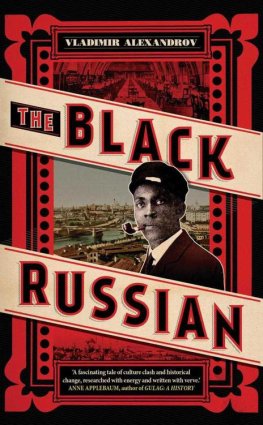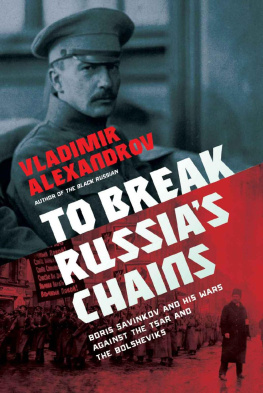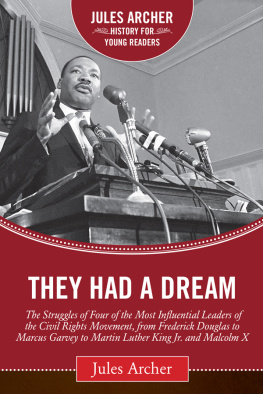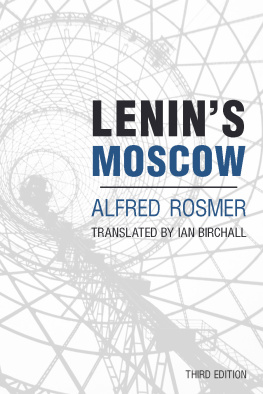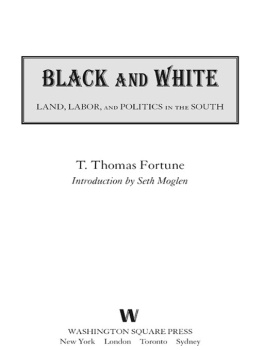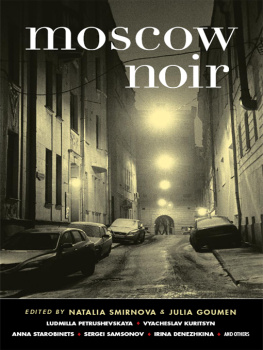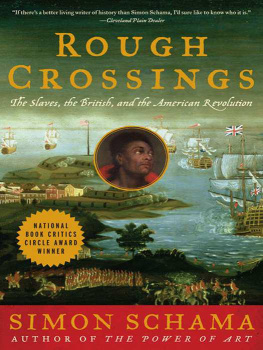Vladimir Alexandrov
THE BLACK RUSSIAN
For Sybil, who heard it all first
All dates for events in Russia prior to 1918 are given in the Old Style (O.S.) calendar: the Julian calendar that was in use until that year and that was thirteen days behind the Gregorian, New Style (N.S.) calendar used in the West during the twentieth century (during the nineteenth, it was twelve days behind). Occasionally a double date is given for clarity in connection with events that were also important in the West: e.g., August 2/15, which means August 2 according to the O.S. calendar and August 15 according to the N.S. calendar.
Russian personal names and place-names are given in their most accessible forms. For Turkish personal names, I use the spelling in my sources. For Turkish place-names, I give the forms used in Western sources during the time I describe, rather than present-day names: thus, Constantinople not Istanbul; Pera not Beyolu; Galata not Karaky; Scutari not skdar; Grande rue de Pera not stiklal Caddessi.
Estimates of what different currencies and sums from the past would be worth in todays dollars are determined by calculators at http://www.measuringworth.com/uscompare/.


The catastrophe should never have happened. On the morning of April 1, 1919, William Jenkins, the American consul in Odessa, a major Russian port on the Black Sea, walked from his office to the London Hotel, where the French army of occupation had set up its headquarters. He was alarmed by the previous days setback on the frontRed Guards had driven Greek and French troops from yet another town to the eastand by the hysterical rumors that were sweeping through the scores of thousands of refugees who had fled to Odessa from Soviet territory. He wanted to meet with the French commander himself, General Philippe dAnselme, and to ask him point-blank what he was going to do in the face of the deteriorating situation. Shortages of food and fuel in the city had become critical. A typhus epidemic was breaking out. Radicalized workers were mutinying and stockpiling guns. And Odessas notorious criminal gangs vied with the Bolshevik underground in robbing homes and businesses, and murdering anyone who got in their way. Jenkins had compiled a list of twenty-nine Americans in the city, including, against all odds, a black man from Mississippi accompanied by a white wife and four mixed-race children. As consul, Jenkins was responsible for the entire groups safety and was beginning to doubt the resolve and reliability of the French.
Although he would not know it for another thirty-six hours, Jenkinss fears were well founded. The French high command in Paris had concluded several days earlier that their military intervention in the Russian civil war had been a mistake. However, General dAnselme skillfully concealed this behind his blunt military manner and proceeded to lie to Jenkinss face.
He began by pretending that he was sharing a confidence with Jenkins, who was, after all, the official representative of an important ally, and admitted that it might perhaps be necessary to evacuate some of the old men, women, and children in Odessa because of food shortages. But when Jenkins pressed the crucial point of a general evacuation of the city, dAnselme assured him that there was absolutely no question of the French army abandoning Odessa.
Jenkins left French headquarters reassured. The following day, Wednesday, April 2, he received written confirmation of what dAnselme had told him. The French commander also broadcast his message to the city at large by publishing announcements in the local newspapers to the effect that although some civilians would have to be evacuatedhe used the strangely callous expression all useless mouthsthe military situation was secure.
In truth, however, the French had already decided to withdraw all forces from Odessa. But rather than organize an orderly evacuation that might take two weekswhich would have been the only way to accommodate 70,000 troops, their equipment, and anywhere between 50,000 and 100,000 civiliansdAnselme and his staff decided to keep their decision secret as long as possible. The city was dangerously overcrowded and they hoped to prevent panic. What they achieved instead was the exact opposite and would become known around the world as the French debacle in Odessa.
Wednesday passed relatively calmly. All the government offices were open and working. After the sun set, the only disturbances were the occasional, familiar crackle of gunfire and detonations of hand grenades as the citys criminals and Bolsheviks began their nightly depredations. In the inner and outer harbors, the French and other Allied warships rested reassuringly at anchor. The bivouacs of the Greek, Senegalese, and Algerian Zouave regiments were quiet.
Then, almost by chance, Jenkins learned the incredible news. Around 10 p.m., Picton Bagge, the British commercial attach in the city, came to him with urgent and confidential information. He had heard from the captain of HMS Skirmisher, a British torpedo boat in the harborthe captain in turn having gotten it from a French admiral in Odessathat the French had decided to give up the city.
Jenkins was stunned: not only had dAnselme lied to him, but the French withdrawal meant that the Bolsheviks would be in Odessa in a matter of days. Jenkins also realized that as soon as word got out, the hordes of White Russian refugees from Moscow, Petrograd, and other places in the north would stampede out of terror that the Bolsheviks would massacre them. With escape by land cut off, the only way out was across the Black Sea, and there were not nearly enough ships for everyone. He would have to rush to get his flock aboard a ship while there was still time.
Most of the Americans trapped in Odessa were in Russia because of business and charitable ventures with which Jenkins was familiar. But the black man who had recently come to see him was unlike anyone he had ever met in Russia before. The man gave his name as Frederick Bruce Thomas and claimed he was an American citizen who owned valuable property in Moscow. He explained that his passport had been stolen from him several months earlier during his harrowing escape by train from Moscow and that he had no other documents to prove his identity; neither did his wife, who he said was Swedish, nor his four children. He was presenting himself at the consulate to claim the protection for himself and his family to which his American origin entitled him.
As Frederick anticipated, his black skin and southern drawl identified him as convincingly as any official piece of paper could have done. But as he also surely knew, any assistance that Jenkins would give was risky: it could be a return ticket to the world of American racism. During the past twenty years, every time Frederick had filled out an application to renew his passport in Western Europe or Russia, American consular officials had noted his skin color on it; the Europeans and Russians, by contrast, seemed never to care about such matters.
However, this time Frederick was facing an even bigger risk. He had concealed something very important about himself when he met Jenkins and could not be sure he would not be found out. Four years earlier, soon after the Great War began, in a move that may have been without precedent for a black American, Frederick became a citizen of the Russian Empire. He had thus automatically forfeited his right to American citizenship, and this meant that he no longer had any moral or legal claim on American protection. But Frederick never told the United States consulate in Moscow what he had done; and, as far as he knew, the Imperial Russian Ministry of Internal Affairs, which presented his petition to Tsar Nicholas II for approval, had also not informed the United States embassy in Petrograd. As a result, neither Jenkins nor any other American official, in Russia or in Washington, was likely to have known the truth.

